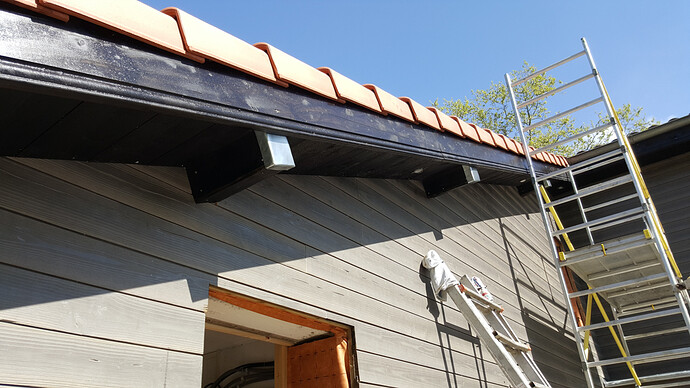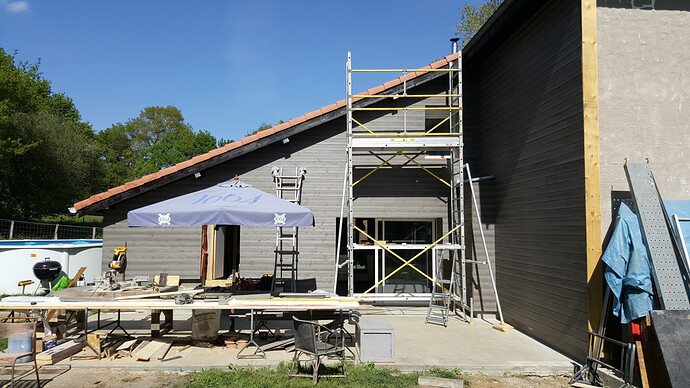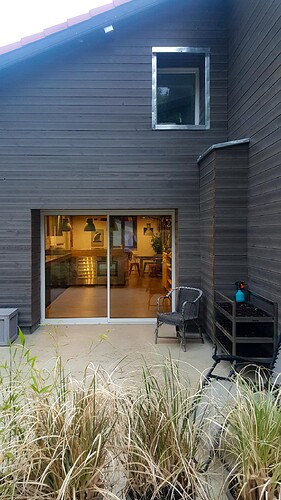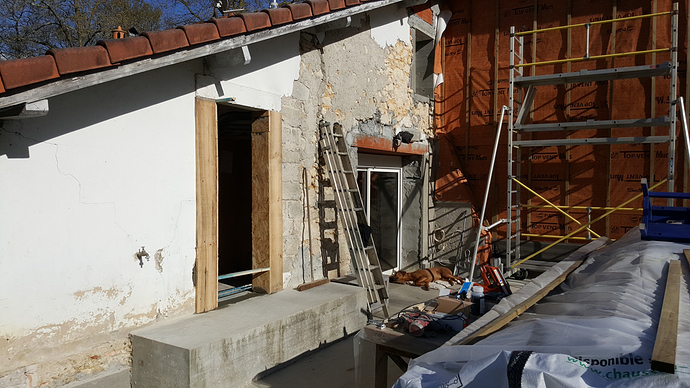Mark… please get back on course with this thread …Renovation.
I’ve just looked-up “Renovation on a Shoe String”… on YouTube… and it gives me “5 Creative Ways to Fasten Shoelaces” among many others…
Fair enough, I suppose… but not quite what I was expecting…
I’m currently renovating, have been for seven years in fact!
I use PVC windows, highly efficient and come in whatever colour suits 
Wow… that looks great… well done…
If you can see both sides why don’t your posts reflect that? Your insistence that all French people do it your way is… well, wrong!
A lovely looking property James. I’ve only seen photos of the inside before.
Can we see a “before” picture…??? please…
It’s superb 
My kind of renovation.
I think people can all do exactly what they like with their own home, it is their taste, their house, their bills. It is personal and it is entirely up to them.
I wouldn’t, however, say ‘ALL French/British/ old/young etc etc etc people do XYZ’ because that is a sweeping generalisation and just silly.
I might go as far as ‘some XYZs tend to…’ but that’s about it.
I haven’t a clue about paint, my painted walls are done with a lime-based paint and I just chose the colours and let my painters get on with it. My shutters will need doing soon I expect but the paint has been perfect so far since it was done in 2000.
I’m afraid I don’t use British artisans though because often I don’t know what training they have had, they have a reputation for cutting corners and many of them aren’t up to speed with local materials and regulations. And unless they have been here for ages they simply don’t have the local contacts etc my marvellous local artisans do.
(I get them by word of mouth, via friends whose houses or offices etc I have seen and liked, ask for a devis from a couple or three and then decide, then keep them until they retire, when I ask them to recommend someone.)
My insistence (well not insistence) is to renovate a property into a product that will sell if you need to. In France, that is to a French market.
There is a thread here (advertising a house) which I had a quick peep at. How you ‘advertise your house’ will largely depend on who you are selling it to. Families, retirees, first time buyers, holiday home, expat buyers. If your house does not fit into any particular bracket, then it will struggle.
I get your point about the pleasure of restoring a house, and keeping it as true to its original design. BUT, many expats move to France and then for whatever reason have to/decide to move back. Being able to sell your house again is an important consideration when taking on a renovation project. For me (at my age) it is the first question I ask.
Please tell me where I a man likely to move back to. I left the UK in 1986 and lived and worked in 12 different locations in Germany before moving to the house I’d owned in France for 18 years. I am home and have the mentality of a European not a profit orientated, ladder climbing member of the British housing market. If, and I repeat, if I had to sell my house I know that it’s location and style would appeal to many French people. Not all but no house would. As I’ve said before, you make your choices but please don’t expect other people with their own varied experiences and tastes to bow down to your ways. Thank God I’m not like you.
That seems very weird to me. I didn’t buy my house thinking about selling it one day and I don’t live in it thinking about selling it some time either. I just live in it and once I am dead my children will decide what to do with it, in the mean time it is our home to be enjoyed. Currently I am thinking about how to make one of my attics into a dormitory for my (as yet very very hypothetical) grandchildren. Possible resale simply doesn’t figure.
Are you saying that mentality does not exist in France then ? You leave university and buy a studio or a 1 bed flat. You then have a family and want a three bed flat or house ? You then then have to sell and move to the other side of France.
You are saying that French people don’t care if the lose money on each sale ?
I don’t think you know much about France to be fair. In Paris a lot of the decent property is owned by property investors. In fact many of the new build apartment blocks around here have already been sold and they won’t even get finished until 2020. Money, money, money.
Bizarre. You always have to try to have the last word. Perhaps you really have lost touch with the UK if you genuinely don’t understand what I wrote. Generalisations and stating the obvious, now that’s narrow minded.
Renovate / modernize, in relation to housing, the objective is to make the residence more comfortable for habitation.
Restoration is an activity to restore an object to some historic state.
When looking for a property to buy I often wondered what were the drivers that prompted past “renovations”. What prompted the changes? Why buy a “pre-loved” residence rather than build new? The answers differ from individual to individual, from epoch to epoch.
Does any one know of any published works exploring the social history of vernacular architecture? Local materials, defence may be factors, but why do the size of houses differ - status, large families?
House size differs according to lots of factors, what the local climate is, for a start! Generally poorer people lived in an extended family group, and what tended to happen was a young couple moving away from the parental home (of one or the other) would have a small house and add bits on as and when. A well-off young couple would have a bigger house because they would probably have live-in servants and plan ahead for a bigger family, also they would be likely to entertain. A much richer young couple would have an even bigger house for entertaining on a grander scale and would have a house in the grounds for their servants and a laundry etc ie all out of their way but convenient. Then people inherit houses when perhaps they have been renting and have to decide what they want to do - and those houses are likely to be to the taste of the previous generation and ‘need sorting out’. Or people may want something completely new and differently heated/organised and just build something. It is just a question of means and taste. Often especially for rural vernacular buildings, they were put up on an ad hoc basis with what there was to hand, ie rocks and earth or clay etc from the fields, no architect needed.
I’m restoration orientated, but then my Breton house is very old. It depends on the quality and the condition of the house, doesn’t it? I am a bit concerned about the short termism of those supporting upvc windows, though. As far as I can tell their life time is 25-35 years, and their production and disposal is damaging to the environment. Maintained wooden windows are expected to last 45 years, though the pitch pine sash windows in my UK house are over 150 years old. (I like to ask the double glazing salesmen if their windows will last as long as the ones I have at the moment). .
Our small French farmhouse had been empty for 30 years when we bought it. The woodwork was unsound, the stone walls needed lime rendering to hold them together, the window frames were rotten. Ours is the first original house seen as you enter the village, with another of similar age or older next door, so to change the facade too much would have meant we might as well have demolished and rebuilt (which would certainly be cheaper). Restoring the interior was not possible: we had a bread oven in the middle of the house, 3m across, which we could not accommodate and which had to be carefully dismantled for possible re-use. The original internal stairs (more like ladders) would have prevented me from going upstairs unless I used the outdoor staircase in the balcony, there was no bathroom, plumbing or sewer and the rear half of the building (formerly the barn with cattle troughs) would have been a metre lower than the front. We, and the village generally, realised that unless we changed it the house would be left to fall down. .Nobody wanted it, except us. Before making an offer to the friend who owned it, we visited the Mairie knowing that planning had already been refused for a project to convert it to flats.
The Maire asked what we planned to do with it: to live in it for the rest of our lives! He was pleased with that response. I pointed out that the rear wall was over-weathered and ready to fall in places, and contained no windows. I explained that we intended to create many openings in it but that we intended to leave the windows in the other three walls in the same places maintaining the same measurements, and leave these facades as they were. The Maire responded that if we left the front as it was (classic Savoyarde balcony and all), we could do as we liked with the back wall. We went straight home and made an offer which was immediately accepted.
We replicated the windows using frames which are wood on the inside and brown metal on the outside, with multiple pane effects like the originals. We demolished all internal walls and floors and replaced them with reinforced concrete (which helped tie the walls together). Then we demolished the rear wall, our mason accepting that the openings for six windows would leave the stone wall unstable anyway, so it was rebuilt in blocks.
The roof was completely replaced, the tiles too deteriorated for reuse, but we saved many beams for decorative use, not structural. Bathrooms have ceiling beams bolted to the concrete floor above, for example, and the large arches between the kitchen and dining room, and the dining room and salon are lined with reclaimed timber.
The front wall was re-rendered by hand in the old way (literally throwing trowels of lime render at the stone) as the end walls will be in due course. The rear wall, however, which with its patio doors and glazed wall above them makes no pretence at echoing the original, was insulated and clad with Eternit Cedral cladding.
As a result, many people in our village think we have done very little to the house as the original doors are still there, the windows look much as they did before and only a new main door in the side wall suggests we have remodelled the interior. We even kept an old door and shuttered window which had led into the épicerie but is now blocked up with a wet room on the other side. The look of our house from the street has universal approval. Only when people come in do they realise how it has changed. Viewed from the rear, a modern wall is seen until you look carefully and see the coin stones at either end of the cladding which we left exposed to emphasise the original structure.
Rather than try to replicate what was there originally, we have tried to pay tribute to the original while modernising (not too drastically). If you believe we should have restored our house, retaining the oven and internal walls and using wooden window frames, you will be disgusted by our decisions. We, and the village generally, realised that unless we changed it the house would be left to fall down, like others around the village.
It is not always possible to restore a house even if one could afford to do so. My favourite house in the world is the Bayleaf found in the Weald and Downland Museum in Sussex. It was demolished carefully and rebuilt faithfully in the Museum along with many other wealden buildings. It would fail all standards today so could not be lived in, it is no longer practical. Our house was not habitable, it hadn’t been for years, and restoration was impossible. Renovation, retaining some features, recalling others, suited us and was locally acceptable as it meant one of the village’s older properties is still standing and lived in. The house is built straight on the Jurassic limestone, with no foundations. Demolishing it and rebuilding to modern standards would not have been cost-effective owing to the engineering required to dig down even a metre for footings.
I’d be interested to know how others would have handled the project - restore, renovate or rebuild, and how they would reach their decision.
What you’re leaving out of the equation is the different attitude to home ownership. In the UK it’s somehow assumed that everybody should aspire to owning their own home, and if they rent it’s because they can’t afford to buy, not because it happens to be a lifestyle choice. There isn’t the same stigma in France. Quite a high proportion of the people I knew at university here didn’t actually buy their first property until they were into their 40s and knew they weren’t likely to be moving again. They could have bought a lot earlier but they didn’t, for the reasons you mention - they knew their needs would change so rather than buy and sell and buy and sell, they rented. In fact several have bought holiday homes where they intend to live when the kids have flown the nest and they retire, and continue to rent their main family home near their job. Makes perfect sense to me because of the low appreciation and the high notaire fees on every transaction (so if you sell at the same price you have still, in effect, lost up to 10%), and the fact that tenants are well protected and also have certain fiscal advantages, plus there is an excellent choice of property to rent if you have a good job and tick all the boxes. People buy when they feel the time is right, there isn’t the same pressure to “get onto the property ladder”. There’s more of a feeling that buying a house is a major life event, it’s not treated as casually as in the UK. Or at least that’s how it was for my generation, maybe the times they are a-changin’ but I’m not sure. As you say a lot of property in Paris is owned by property investors not by owner occupiers, and not only in Paris. I would be surprised if there weren’t a lot more professional landlords in France than in the UK because that’s the way to make money from property here, not by owner occupiers buying and selling their own homes.
Hmmmm…hello.
If your analysis is correct why is there a booming property market in France ?




